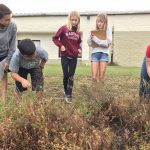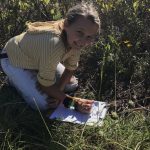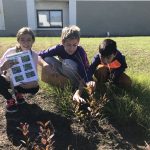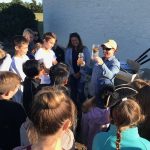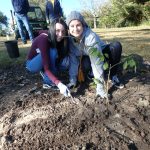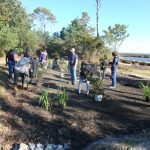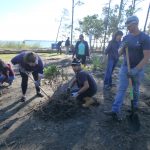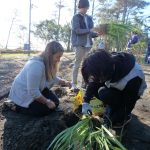The North Carolina Coastal Federation has been busy with creating functioning rain gardens throughout the community. The soil and plants in these spaces will filter out pollutants and reduce stormwater runoff. Education Coordinator Sara Hallas and Coastal Specialist Leslie Vegas spent time exploring the rain garden at First Flight Middle School with students. Over the course of two days, eight classes of sixth grade students spent their science class outside, utilizing the rain garden as an outdoor classroom. The students’ first task was to locate and identify a specific plant in the garden; then they took time making a sketch of the plant and listing several observations.
Following the plant identification activity, the students participated in stewardship activities, pulling weeds and clearing debris from the rain garden. Federation interns, Kat Iwashchenko and Jenn Allen, provided assistance during some of these classes. First Flight Middle School science teachers Leslie Wiles and Stacey Hanf helped coordinate this activity making it easier to have this project on school grounds because no permission slips are necessary to take science learning outdoors.
The federation staff also worked with a group of students from the Dare Learning Academy to help replant a bioretention area at Roanoke Island Festival Park. This project was established several years ago through the Community Conservation Assistance Program with Dare County Soil and Water Conservation. After many storms and sound-side overwash, some of the plantings needed to be replaced. Roanoke Island Festival Park staff were grateful for the assistance of the students to help make light work of the new plantings.
“We helped to sustain the natural environment of the beautiful place we live in. I am glad we got the privilege to learn more outside of the classroom, it was actually a lot of fun,” said Lyndsey Walker-Lee, one of the students on the field trip.
About 14 students and several teachers, including science teacher Dawn Tillett, spent the morning at Festival Park. The students also had the chance to learn about and observe components of a living shoreline project in place around the park as well as take some water quality readings. The Outer Banks Community Foundation contributed support for these environmental educational experiences.
Check out photos from these activities below:

